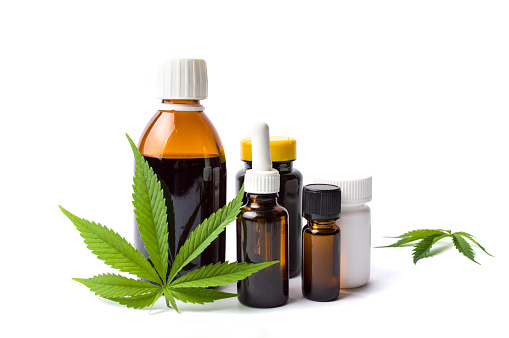A new study suggests CBD could play a role in fighting antibiotic-resistant bacteria. Many U.S. cannabis advocates say it’s further evidence that legal barriers to cannabis research need to come down — and fast.
Amid all the utopian sensationalism about the supposedly salubrious properties of the cannabinoid CBD, some are developing a skeptical attitude toward the newest amazing claims. But the latest is among the most ambitious we’ve heard yet.
On Aug. 28, new research was published that suggests CBD can help antibiotics fight antibiotic-resistant bacteria. The research, conducted by a team of scientists based in the United Kingdom and published in the peer-reviewed journal Frontiers in Cellular and Infection Microbiology, examined a strain of E. coli bacteria and its release of “membrane vesicles,” which bacteria use to communicate and spread. The researchers found that CBD enhanced an antibiotic’s ability to stop the release of those membrane vesicles.
“CBD may pose as a putative adjuvant agent for tailored co-application with selected antibiotics,” the researchers concluded. Or, in regular speak: CBD can help antibiotics fight specific bacteria better. They continued that, therefore, CBD may “help reduce antibiotic resistance.”
This study reinforces a recent discovery from Australian researchers that found CBD killed all strains of bacteria they tested in a laboratory — including some that have developed resistance to existing antibiotics. Even more encouragingly, the bacteria did not develop resistance to CBD after being exposed to it for 20 days. They concluded that CBD may be able to outmaneuver the entire process by which superbugs develop.
Mark Blaskovich, team leader from the University of Queensland’s Institute for Molecular Bioscience, admitted to Newsweek, “We still don’t know how it works… [I]t may have a unique mechanism of action given [that] it works against bacteria that have become resistant to other antibiotics, but we still don’t know how.”
The findings were presented at the American Society for Microbiology’s Microbe 2019 conference in San Francisco in June. The findings have not yet been published in a peer-reviewed journal.
So the research, as promising as it seems, is in the early stages. When asked for his advice for those who might ditch standard antibiotics for cannabis-based home remedies, Blaskovich responded unequivocally: “Don’t! Most of what we have shown has been done in test tubes — it needs a lot more work to show it would be useful to treat infections in humans.”
At this stage, “it would be very dangerous to try to treat a serious infection with cannabidiol instead of one of the tried and tested antibiotics,” he stressed.
Medical Establishment Paying Attention
The Australian study has won interest from the medical establishment, with a flurry of coverage in both popular and trade journals since the San Francisco unveiling in June.
CBD was found to disrupt biofilm, the layer of liquid around bacteria cells that makes it difficult for antibiotics to penetrate and kill. Results showed that “CBD is much less likely to cause resistance than the existing antibiotics,” Blaskovich said.
The researchers looked at how effective CBD was compared to common antibiotics, such as vancomycin (marketed as Vancocin) and daptomycin — to very positive results.
In the Australian study, the researchers also unfortunately found the CBD to be effective against Gram-positive bacteria but not Gram-negative. Gram-positive strains cause serious skin infections and pneumonia, among other conditions. Gram-negative types include salmonella and E. coli, more associated with gastrointestinal disorders.
Among the stateside companies enthused by the antimicrobial potential of CBD is EcoGen Laboratories of Grand Junction, Colorado. With 160,000 square feet of greenhouse cultivation, EcoGen is a major source of the CBD isolate and distillate found in products available in retail outlets nationwide. It is also providing isolate, distillate and plant samples to researchers at UCLA and other universities.
EcoGen chief growth officer Derek Du Chesne told Cannabis Now that he hopes that the promising claims of the Australian study will help break down the barriers to research in the United States.
“We would love to supply them cannabinoids and material they will need to develop CBD antibiotics,” he says.
Du Chesne rattled off various established applications of CBD — for instance, he says it is already being used in dental offices as a supplemental anti-inflammatory treatment. But he also urges research into the pharmacological value of the “lesser known cannabinoids.”
He mentions cannabicyclol (CBL), cannabigerol (CBG), cannabichromene (CBC) and cannabinol (CBN) as holding possibilities for similar breakthroughs.
Du Chesne calls CBG the “next one in the spotlight” for its anti-inflammatory value. CBN research shows potential for cancer-fighting, sleep-aiding and anti-seizure applications. Du Chesne acknowledges that CBN is difficult to extract, and is only found in trace amounts in the plant. “But extraction technology is improving,” he says.
A freer legal environment also helps to make extraction of such cannabinoids more viable: “Four years ago, CBD isolate went for $20,000 a kilo. Now it’s $2,000 a kilo due to the supply chain being freed up by the Farm Bill.” CBG now goes for $30,000 a kilo, half what it was last year.
“There’s been a lot more money put toward suppressing the research than toward the research,” Du Chesne notes. “The science hasn’t caught up with the market, Now that the raw material is available and the restrictions on the research are going down, it is going to affect the pharmaceutical business in a very large-scale way.”







